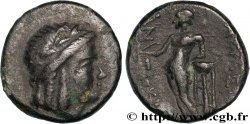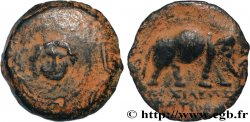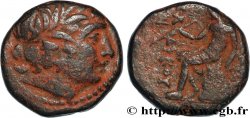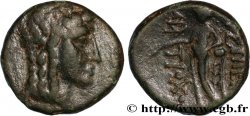v51_0257 - SYRIA - SELEUKID KINGDOM - ANTIOCHUS III THE GREAT Tétradrachme
MONNAIES 51 (2011)
Starting price : 750.00 €
Estimate : 1 200.00 €
Realised price : 1 303.00 €
Number of bids : 5
Maximum bid : 1 650.00 €
Starting price : 750.00 €
Estimate : 1 200.00 €
Realised price : 1 303.00 €
Number of bids : 5
Maximum bid : 1 650.00 €
Type : Tétradrachme
Date: c. 197-187 AC.
Mint name / Town : Syrie, Antioche
Metal : silver
Diameter : 28 mm
Orientation dies : 12 h.
Weight : 16,87 g.
Rarity : R2
Emission: 4e
Coments on the condition:
Exemplaire sur un petit flan, bien centré des deux côtés, de haut relief. Portrait de toute beauté. Revers de style fin, bien venu à la frappe de haut relief. Jolie patine de collection ancienne avec des reflets mordorés. Conserve la plus grande partie de son brillant de frappe et de son coupant d’origine
Catalogue references :
Predigree :
Cet exemplaire provient de la vente Kurpfälzische Mannheim, décembre 1993
Obverse
Obverse legend : ANÉPIGRAPHE.
Obverse description : Tête diadémée d'Antiochus III à droite entourée de la stemma.
Reverse
Reverse description : Apollon nu assis à gauche sur l'omphalos, tenant une flèche de la main droite et appuyé sur son arc de la main gauche ; dans le champ à droite, un monogramme.
Reverse legend : BASILEOS/ ANT-IOCOU/ (HF).
Reverse translation : (du roi Antiochus).
Commentary
Mêmes coins que l’exemplaire de la collection Spaer (SNG. Spaer, n° 550, pl. 37 = Lanz 40, 25 mai 1981, n° 383, illustré dans l’ouvrage de Le Rider, p. 147, n° 268, pl. 16/20) et que l’exemplaire de la collection Dewing, (Dewing, p. 160, n° 2576, pl. 127 = Le Rider, p. 147, n° 267, pl. 16/19).








 Report a mistake
Report a mistake Print the page
Print the page Share my selection
Share my selection Ask a question
Ask a question Consign / sell
Consign / sell
 Full data
Full data



